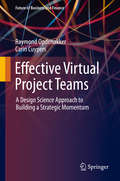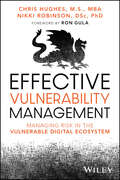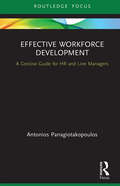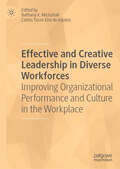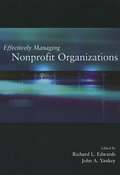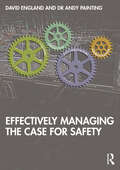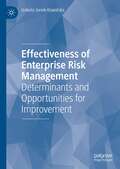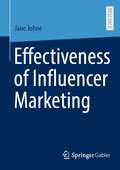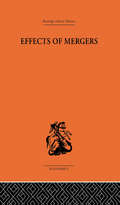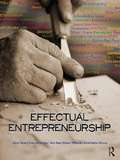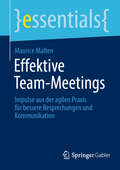- Table View
- List View
Effective Virtual Project Teams: A Design Science Approach to Building a Strategic Momentum (Future of Business and Finance)
by Raymond Opdenakker Carin CuypersCollaborating in virtual teams is a new reality in modern project management and work environments. Its emergence calls for an extensive analysis and re-alignment on the part of organizations, so as to help virtual teams maintain 'strategic momentum' – a concept that this book introduces. Strategic momentum represents perseverance with regard to pursuing a virtual team’s strategy; a 'flywheel' concept that drives the team members to concentrate on the project tasks until they have reached their shared goal. The authors present a design science based model, together with an in-depth qualitative study involving eight virtual R&D project teams. In this model, strategic momentum is assessed in terms of empowerment, team task insight, and collective commitment. These three determinants can be promoted and sustained by various contextual factors and interventions on the part of the management. The authors also provide a wealth of practical tips to help practitioners and consultants generate and sustain strategic momentum in their own contexts when working with virtual teams.
Effective Vulnerability Management: Managing Risk in the Vulnerable Digital Ecosystem
by Chris Hughes Nikki RobinsonInfuse efficiency into risk mitigation practices by optimizing resource use with the latest best practices in vulnerability management Organizations spend tremendous time and resources addressing vulnerabilities to their technology, software, and organizations. But are those time and resources well spent? Often, the answer is no, because we rely on outdated practices and inefficient, scattershot approaches. Effective Vulnerability Management takes a fresh look at a core component of cybersecurity, revealing the practices, processes, and tools that can enable today's organizations to mitigate risk efficiently and expediently in the era of Cloud, DevSecOps and Zero Trust. Every organization now relies on third-party software and services, ever-changing cloud technologies, and business practices that introduce tremendous potential for risk, requiring constant vigilance. It's more crucial than ever for organizations to successfully minimize the risk to the rest of the organization's success. This book describes the assessment, planning, monitoring, and resource allocation tasks each company must undertake for successful vulnerability management. And it enables readers to do away with unnecessary steps, streamlining the process of securing organizational data and operations. It also covers key emerging domains such as software supply chain security and human factors in cybersecurity. Learn the important difference between asset management, patch management, and vulnerability management and how they need to function cohesively Build a real-time understanding of risk through secure configuration and continuous monitoring Implement best practices like vulnerability scoring, prioritization and design interactions to reduce risks from human psychology and behaviors Discover new types of attacks like vulnerability chaining, and find out how to secure your assets against them Effective Vulnerability Management is a new and essential volume for executives, risk program leaders, engineers, systems administrators, and anyone involved in managing systems and software in our modern digitally-driven society.
Effective Work Breakdown Structures
by Gregory T. Haugan PhD, PMPAt last - the first comprehensive and practical guide to the work breakdown structure (WBS) in 45 years! This book offers vital new perspectives on how to apply the WBS to today's different types of projects that produce products, services or results. You'll learn how to use WBS throughout the project lifecycle to plan, control and communicate. Your new insights into the WBS principles, plus checklists and proven action steps, will improve the planning of new projects and help you launch projects more efficiently and effectively.
Effective Workforce Development: A Concise Guide for HR and Line managers (Routledge Focus on Business and Management)
by Antonios PanagiotakopoulosDeveloped for busy HR practitioners and trainers, this book provides a concise guide to the theory and practice of employee training in contemporary organizations. Reflecting the importance of employee development to learning-based organisations in the knowledge economy, it clearly links employee training needs to business development and offers an accessible guide to current theories combined with research-based practical guidance in how to design effective training programs. Covering all the current theories about training and development and the latest thinking about workplace learning interventions, this concise, practical guide will be an essential source for HR practitioners and line managers seeking improve organizational learning and performance.
Effective and Creative Leadership in Diverse Workforces: Improving Organizational Performance and Culture in the Workplace
by Bethany K. Mickahail Carlos Tasso de AquinoThis book examines the role of corporate culture in the execution of successful strategies for diversity and innovation. It explores how information is communicated across real organizations and how diversity impacts the effectiveness of the communication. As modern communication becomes more challenging within diverse groups, the varying content and contexts must be considered. Communications across a diverse organization requires thought and understanding. Further, though a workforce may be diverse, it may not properly function. Effective and creative leadership is needed to employ a diverse workforce for the greatest impact on company culture and performance. With its model and case studies illustrating how diversity helps shape corporate culture, this book serves as a valuable resource for HR researchers and scholar-practitioners.
Effectively Managing Natural Gas Costs
by John M. StudebakerNatural gas purchasing is generally deregulated on a federal or interstate basis. However, intrastate, there are many conditions that come into play which typically translate into higher costs for the commercial or industrial user. This book is intended to serve as comprehensive reference which can be used by the natural gas purchaser to sort out both the potential pitfalls that can negatively impact gas costs, and the opportunities for significant savings available to the informed user. Each step in the process of natural gas production and delivery to the marketplace is thoroughly examined, including production, inter/intrastate transportation, regulation, cost factors, local distribution, company structures, and deregulation processes. Also fully covered is the natural gas LDC billing process, and how understanding it can lead to significant savings.
Effectively Managing Nonprofit Organizations
by Richard L. Edwards John A. YankeyEdwards (social work, Rutgers) and Yanky (family and child welfare, Case Western Reserve U. ) present a revision and expansion of two earlier books, Skills for Effective Human Services Management (1991) and Skills for Effective Management of Nonprofit Organizations (1998). Featuring contributions from 31 American academics, consultants, and nonprofit professionals, the text offers nonprofit managers a guide to the skills and competencies needed to lead today's nonprofit organizations successfully. The text is organized around the "competing values framework," a meta-theoretical model of organizational and managerial effectiveness. Coverage includes an overview of the framework followed by sections on its four skill areas--boundary-spanning, human relations, coordinating, and directing--and discussion of the skills needed to manage in turbulent times. For mid- and upper-level managers, and students of nonprofit or public management. Annotation ©2007 Book News, Inc., Portland, OR (booknews.com)
Effectively Managing the Case for Safety
by David England Andy PaintingThis book examines how safety failings during the use of any designed product or system—be it a car, a building, or a chemical plant—can be mitigated through effective understanding of the conditions and controls surrounding its use. Drawing on historical failures and their own real-world experience, Dr Andy Painting and David England explain how corporate culture, engineering safety, personnel selection, and proper safety auditing are key ingredients to maintaining safety in all aspects of an organization’s operations. This effective strategy is also crucial to linking back to the design of future products in establishing where operational failures have been identified and can therefore be "designed out" in future iterations. The book challenges silo thinking among the various safety-related disciplines and shows how this can be counter-productive to effective safety management. Effectively Managing the Case for Safety draws on key features from engineering, design, and health and safety processes, which, when used cohesively, promote a better working environment for everyone and help to reduce wasted time, money, and effort for any organization. Safety is tracked from the initial design stage through any product’s entire service life and includes evidence of how safety affects, and is affected by, all those who interact with a product, system, or project. Following their first book, An Effective Strategy for Safe Design in Engineering and Construction, which demonstrated how current construction regulations can be used as a framework to ensure that safety is embedded into the design of virtually any product from machinery to buildings, this follow up book defines what safe is, how it is initially derived, and how the operational safety of any product, during its in-use phase, can be managed and assessed. The result is not only to ensure compliance with relevant regulations but also to actively ensure the ongoing safety of all those who interact with a product or project.
Effectiveness of Enterprise Risk Management: Determinants and Opportunities for Improvement
by Izabela Jonek-KowalskaEffective risk management is a crucial part of the success of any organization. In scholarly research, numerous publications have been written on the design of complex enterprise risk management systems, however very little consideration has been given to the effectiveness of implemented management solutions. This book seeks to fill this important gap. Based on a study featuring a representative group of 722 companies, the author presents the various determinants of risk management effectiveness, including behavioural determinants (such as attitude to risk) as well as internal and external determinants (such as human and financial resources and the environment in which the organization operates). Along with a theoretical and practical overview of the various considerations from an international perspective, the reader will gain an insight into the implications for practice. Ultimately, this book formulates conclusions and recommendations for the improvement of tools and systems of enterprise risk management.
Effectiveness of Influencer Marketing
by Jane JohneInfluencers are defined as independent opinion leaders on social media networks who influence the attitudes of their followers through blogs, tweets and the use of other social media. As a result, influencer marketing has become an integral part of brands' marketing strategies. This book has the overarching goal to examine the impact of influencer marketing on consumer behavior and the resulting business success. The first empirical project explicitly examines the question of which influencer characteristics should be considered in the selection process in order to increase different campaign metrics along the consumer decision journey. Campaign data from several brands is used for the project and is extended with survey data from a large-scale consumer survey. The second empirical project examines how the influencer marketing channel, compared to other firm and consumer activities, affects consumer interest and firm performance. The project uses historical data from one of Europe's largest specialized online retailers and analyzes it in a time series model.
Effects of Foreign Aid: Evidence from Thailand (New Frontiers in Regional Science: Asian Perspectives #50)
by Hiroaki SakuraiThis book focuses on the impact and effectiveness of foreign aid or official development assistance (ODA) from several aspects, as in the exemplary case of Thailand—factors that are important for formulating growth and fiscal policies to use foreign aid efficiently. Specifically, the book is devoted to analyzing the belief among aid practitioners that foreign aid, aimed mainly at wider access to social infrastructure, is one of the important elements for increasing living standards. Thailand has attained economic growth and poverty reduction while it has been receiving foreign aid for more than 50 years, with Japan providing one of the major portions of that aid. However, there is no established theory in the field of economics and related disciplines about whether foreign aid helps developing countries to improve the livelihoods of the poor. According to the analysis advocated in this book, foreign aid to Thailand contributes to economic growth. Moreover, the Thai government generally has governed foreign aid well and maintained sound management of finance primarily by reducing domestic borrowing as an alternative to foreign aid. The book shows that a kind of inter-dependent strategic relation has been established and managed well among aid agencies. These results, introduced by long-term data, are consistent with widely accepted ideas, while the effect of foreign aid itself is still under discussion. This book is intended to answer the needs of aid donors and policymakers as well as researchers and Ph.D. students. In addition, it suggests that other developing countries following similar policies should look to evidence from Thailand to reinforce their own cases.
Effects of Insurance on Maritime Liability Law
by Muhammad Masum BillahThe book examines how the absence of insurance in the past led to some special maritime liability law principles such as 'general average' (i. e. , losses or expenses shared by all the parties to a maritime adventure) and the limitation of shipowners' liability. In the absence of insurance, these principles served the function of insurance mostly for shipowners. As commercial marine insurance is now widely available, these principles have lost their justification and may in fact interfere with the most important goal of liability law i. e. , deterrence from negligence. The work thus recommends their abolition. It further argues that when insurance is easily available and affordable to the both parties to a liability claim, the main goal of liability law should be deterrence as opposed to compensation. This is exactly the case with the maritime cargo liability claims where both cargo owners and shipowners are invariably insured. As a result, the sole focus of cargo liability law should be and to a great extent, is deterrence. On the other hand in the vessel-source oil pollution liability setting, pollution victims are not usually insured. Therefore oil pollution liability law has to cater both for compensation and deterrence, the two traditional goals of liability law. The final question the work addresses is whether the deterrent effect of liability law is affected by the availability of liability insurance. Contrary to the popular belief the work attempts to prove that the presence of liability insurance is not necessarily a hindrance but can be a complementary force towards the realization of deterrent goal of liability law.
Effects of Mergers
by Ruth Cohen P. Lesley CookEffects of Mergers charts the history of six industries with a view to examining the effects of mergers. It deals both with the short and long-term effects of changes in the structure of industry and looks at issues such as whether mergers are in the public interest.The industries covered are: Cement, Textile Printing, Soap, Glass, Motor and Brewing.Some comparative material with industries in the USA is included.
Effects of Slowdown in Industrial Countries on Growth in Non-Oil Developing Countries
by Morris Goldstein Mohsin S. KhanA report from the International Monetary Fund.
Effects of U.S. Tax Policy on Greenhouse Gas Emissions
by National Research Council William D. Nordhaus Policy and Global Affairs Board on Science, Technology, and Economic Policy Committee on the Effects of Provisions in the Internal Revenue Code on Greenhouse Gas Emissions Paul T. Beaton Stephen A. MerrillThe U.S. Congress charged the National Academies with conducting a review of the Internal Revenue Code to identify the types of and specific tax provisions that have the largest effects on carbon and other greenhouse gas emissions and to estimate the magnitude of those effects. To address such a broad charge, the National Academies appointed a committee composed of experts in tax policy, energy and environmental modeling, economics, environmental law, climate science, and related areas. For scientific background to produce Effects of U.S. Tax Policy on Greenhouse Gas Emissions, the committee relied on the earlier findings and studies by the National Academies, the U.S. government, and other research organizations. The committee has relied on earlier reports and studies to set the boundaries of the economic, environmental, and regulatory assumptions for the present study. The major economic and environmental assumptions are those developed by the U.S. Energy Information Administration (EIA) in its annual reports and modeling. Additionally, the committee has relied upon publicly available data provided by the U.S. Environmental Protection Agency, which inventories greenhouse gas (GHG) emissions from different sources in the United States. The tax system affects emissions primarily through changes in the prices of inputs and outputs or goods and services. Most of the tax provisions considered in this report relate directly to the production or consumption of different energy sources. However, there is a substantial set of tax expenditures called "broad-based" that favor certain categories of consumption--among them, employer-provided health care, owner-occupied housing, and purchase of new plants and equipment. Effects of U.S. Tax Policy on Greenhouse Gas Emissions examines both tax expenditures and excise taxes that could have a significant impact on GHG emissions.
Effects of the Covid-19 Pandemic on Employee Well-Being: Perspectives from a Developing Economy
by Sharmila Jayasingam Raida Abu Bakar Rosmawani Che Hashim Man Chung Low Mohammad Rezaur RazzakThis book contributes toward the understanding of the human experience at work during the pandemic and its implications on employee well-being in the context of Malaysia, a developing economy with its own set of unique challenges. Very little research has been done about this issue to date, particularly in Malaysia. This book aims to bridge this gap by examining the Malaysian perspective of the concept of employee well-being in detail with the overarching goal of serving as a guide toward overcoming the challenges wrought on by the ever-changing post-pandemic environment. Different conditions and experiences are discussed to contextualize the unique ways in which individuals react to difficulties with an emphasis on how organizations can assist at a micro-level to allow employees to overcome such difficulties.
Effectual Entrepreneurship
by Robert Wiltbank Stuart Read Saras Sarasvathy Nick Dew Anne-Valérie OhlssonWhat are you waiting for? Whether you're dreaming about starting a business, learning about entrepreneurship, or on the brink of creating a new opportunity right now, don't wait. Open this book. Inside you will find everything you need. This book contains: a vivid new way to learn about and to practice entrepreneurship. practical exercises, questions and activities for each step in your process. specific principles derived from the heuristics of expert entrepreneurs. 70+ case briefs of entrepreneurs across industries, geographies and time. applications to social entrepreneurship as well as the creation of opportunities in large enterprises. data that will challenge assumptions you might have about entrepreneurship. a broader perspective about the science of entrepreneurship and implications for how individuals can shape their own situation. extra resources are also available on the accompanying website: http://www.effectuation.org/ You will find these ideas presented in a concise, modular, graphical form, perfect for those learning to be entrepreneurs or already in the thick of things. If you want to learn about entrepreneurship in a way that emphasizes action, this book is for you. If you have already launched your entrepreneurial career and are looking for new perspectives, this book is for you. Even if you are someone who feels your day job is no longer creating anything novel or valuable, and wonders how to change it, this book is for you. Anyone using entrepreneurship to create the change they want to see in the world will find a wealth of thought-provoking material, expert advice, and practical techniques inside. So what are you waiting for?
Effectual Entrepreneurship
by Saras Sarasvathy Glen B. WheatleyWhether you come to this book as an entrepreneurship student, a corporate manager, someone seeking regenerative social change, or a seasoned creator of new ventures, you already know that entrepreneurship is the primary engine of growth, innovation, and financial self-reliance. What you will discover in this book is that there is a science to entrepreneurship—a shared logic that can be observed in expert entrepreneurs across industries, geographic locations, and time. We call this logic effectuation—which means working with things already within your control to co-create valuable new futures with people who want to work with you.At the heart of the book you will find the four core principles of effectuation that expert entrepreneurs follow when creating new ventures, products, and markets: Start with your means Set affordable loss Form partnerships Leverage contingencies In this book, each of these core principles is explained through cases, stories, thought exercises, and a variety of practical applications.Presented in the concise, modular, graphical form made popular in previous editions, Effectual Entrepreneurship is perfect both for those seeking to become entrepreneurs, and those already in the thick of things!A wealth of thought-provoking material, expert advice, and practical techniques resides in these pages and on the accompanying website: www.effectuation.org.
Effectual Entrepreneurship
by Robert Wiltbank Stuart Read Saras Sarasvathy Nick DewWhat are you waiting for? Whether you’re dreaming about starting a business, learning about entrepreneurship or on the brink of creating a new opportunity right now, don’t wait. Open this updated bestseller. Inside you’ll find everything you need, including: a new and popular way to learn about and to practice entrepreneurship. new practical exercises, questions and activities for each step in your process. specific principles derived from the methods of expert entrepreneurs. over seventy updated case briefs of entrepreneurs across industries, locations and time. new applications to social entrepreneurship, technology and to large enterprises. plentiful connections to current and foundational research in the field (Research Roots) brand new chapter on "The Ask" - strategies for initiating the process of co-creating with partners data that will challenge conventional entrepreneurship wisdom a broader perspective on the science of entrepreneurship In this vibrant updated edition, you will find these ideas presented in the concise, modular, graphical form made popular in the first edition, perfect for those learning to be entrepreneurs or those already in the thick of things. If you want to learn about entrepreneurship in a way that emphasizes action, this new edition is vital reading. If you have already launched your entrepreneurial career and are looking for new perspectives, take the effectual entrepreneurship challenge! this book is for you. If you feel that you are no longer creating anything novel or valuable in your day job, and you’re wondering how to change things, this book is for you. Anyone using entrepreneurship to create the change they want to see in the world will find a wealth of thought-provoking material, expert advice and practical techniques in these pages and on the accompanying website: www.effectuation.org So, what are you waiting for?
Effectuation entwickeln: Ein auf Reinforcement Learning aufbauender agentenbasierter Modellierungsbeitrag zur Formalisierung unternehmerischen Verhaltens
by Martin SterzelIn diesem Open-Access-Buch wird ein Rahmenwerk entwickelt, das simulationsbezogene Untersuchungen von Effetcuation ermöglicht und gleichzeitig die Grundlage für die Entwicklung von gründungsunterstützenden Entscheidungssystemen schafft. Es wird diskutiert, inwieweit effektuatives Lernen modelliert und algorithmisch interpretiert werden kann. Auf Basis der Vorstellung und kritischen Evaluierung aktueller Simulationsmodelle, die Effectuation abbilden, wird mit Hilfe von Methoden agentenbasierter Modellierung und des Reinforcement Learnings ein aggregiertes Modell entwickelt, das effektuatives Verhalten im Rahmen einer prototypischen Gründungssituation ermöglicht. Die Ergebnisse zeigen, dass ein entrepreneurialer Agent in der Lage ist, effektuatives Verhalten zu erlernen. Leistungsunterschiede während des Lernens ergeben sich bei Veränderung seiner Umgebung. Der Erfolg des Agenten ist abhängig von der Verbindlichkeit potentieller Partner und Kunden. Weiterhin lässt sich ein Lernerfolg feststellen, wenn der Agent das Affordable-Loss-Prinzip in Verbindung mit marktkonformem Verhalten anwendet. Mit dem entwickelten Modell können künftig, unter Einbeziehung des Entscheidungsverhaltens eines realen Entrepreneurs, weitere Untersuchungen zum effektuativen Lernverhalten durchgeführt werden.
Effectuation: Rethinking Fundamental Concepts in the Social Sciences (Elements in Business Strategy)
by Saras SarasvathyEffectuation has become the basis for educating entrepreneurs and managers. Derived from cognitive and behavioral economic studies of expert entrepreneurs, effectuation shows how to cocreate value in highly uncertain situations. The framework of effectuation consists in techniques that minimize the use of predictive information and ways to turn control itself into strategy. In doing so, the effectual process opens up radically new ways to rethink a variety of fundamental concepts in all the social sciences. This ranges from risk and return to markets and governments in economics; attitudes toward ends and means in psychology; opportunism and altruism in social psychology; and even success and failure in strategic management. Effectuation theory inverts several older approaches in what Herbert Simon referred to as the 'sciences of the artificial'. These inversions suggest an entrepreneurial method based on non-predictive control that complements the predictive control techniques of the scientific method.
Effekte des Einsatzes integrierter Unternehmenssoftware im kaufmännischen Unterricht an Berufsschulen
by Claudio SpenerObwohl der berufsschulische Einsatz integrierter Unternehmenssoftware, den sogenannten ERP-Systemen, in der einschlägigen Literatur seit geraumer Zeit diskutiert wird, gibt es bis heute kaum robuste empirische Untersuchungen zu dessen Wirksamkeit. Die vorliegende Studie untersucht die Effekte des ERP-Einsatzes sowie des begleitenden bzw. eigenständigen Einsatzes der Prozessmodellierung hinsichtlich kognitiver und motivationaler Zielgrößen mittels eines (quasi-)experimentellen Pre-/Posttest-Designs. Aus den Ergebnissen lassen sich bedeutsame Implikationen für die schulische Praxis ableiten.
Effektive Team-Meetings: Impulse aus der agilen Praxis für bessere Besprechungen und Kommunikation (essentials)
by Maurice MaltenDieses essential gibt eine kompakte Einführung, wie Team-Meetings in Organisationen und Unternehmen effektiver geplant, gestaltet und moderiert werden können. Meetings sind entscheidend für die Zusammenarbeit in Organisationen, ermöglichen den Austausch von Informationen und die Entwicklung von Strategien. Trotz ihrer Bedeutung sind sie oft ineffektiv und frustrierend – oft gibt es keine klare Agenda, endlose Diskussionen, kein klares Ergebnis und wichtige Punkte werden oft nicht angesprochen. Impulse aus der agilen Arbeitswelt zeigen neue Perspektiven und Möglichkeiten für erfolgreichere Meetings und gehen dabei insbesondere auf die Rolle der Moderation ein.
Effektiver Umgang mit Stress: Gesundheitsmanagement Im Beruf (Die Wirtschaftspsychologie)
by Julia Reif Erika Spieß Peter StadlerDieses Buch basiert auf Erkenntnissen aus Wissenschaft und Praxis, die aufzeigen was beruflicher Stress aus uns macht und wie wir besser mit Stress umgehen können. Die Autoren bringen klassische und aktuelle Erkenntnisse aus der psychologischen Stressforschung auf den Punkt und verdeutlichen Stress und das damit verbundene komplexe Ursachengefüge anhand eines praxisrelevanten Models. Als Leser lernen Sie, wie positiv sich gefährdungsfreies Arbeiten auf das Wohlbefinden und die Motivation der Mitarbeiter auswirkt und wie es Unternehmen und Führungskräften gelingen kann, eine humane Arbeitswelt zu gestalten. Erfahren Sie durch zahlreiche Fall- und Praxisbeispiele, Checklisten, Fragebögen, Ansätze zur Gestaltung sowie Tipps und Tricks, wie eine Arbeitsatmosphäre geschaffen werden kann, in der Menschen ohne gesundheitliche Schädigung und psychische Gefährdungen arbeiten können. Einige der inhaltlichen Highlights mit starkem Praxisbezug:Woher kommt Stress bzw. wie entsteht Stress?Welche Ressourcen stehen zur Verfügung, um den Stress abzumildern?Was kann ich gegen Stress tun? Wie sind negative Langzeitfolgen von Stress zu behandeln?Wie führe ich eine Gefährdungsbeurteilung durch?Zielgruppen sind alle, für die ein effektiver Umgang mit Stress von Bedeutung ist, d.h. Führungskräfte, Betriebsräte, Arbeitsschutzakteure, Mitarbeiter, betriebliche Experten und Studierende.
Effektiver und besser Führen in Teilzeit: Hintergründe und zeitgemäße Maßnahmen für ein flexibles Führungsmodell
by Silke Katterbach Kerstin StöverDieses Fachbuch vermittelt theoretisch fundiert,wie Teilzeit-Führung zukünftig als Alltagsmodell für flexiblere Arbeitsstrukturen in Unternehmen umgesetzt werden kann.Die Autorinnnen stellen die komplexen Zusammenhänge von Teilzeit-Führung dar, zeigen relevante Hintergrundinformationen auf und beschreiben mögliche Gründe für die unzureichende Akzeptanz von Teilzeit-Führung. Zudem verdeutlichen sie, welche tiefliegenden Überzeugungen und kulturellen Muster ein Umdenken von Vollzeit-Führung in die Teilzeit-Führung verhindern, jedoch neue flexible Arbeitszeit- und Führungsmodelle durch den gesellschaftlichen Wandel zwingend nötig sind.Das Buch enthält hilfreiche Denkanstöße, praktische Tipps und inspirierende Beispiele für Entscheider sowie Mut machende Empfehlungen für ambitionierte Teilzeit-Führungskräfte der Zukunft.
